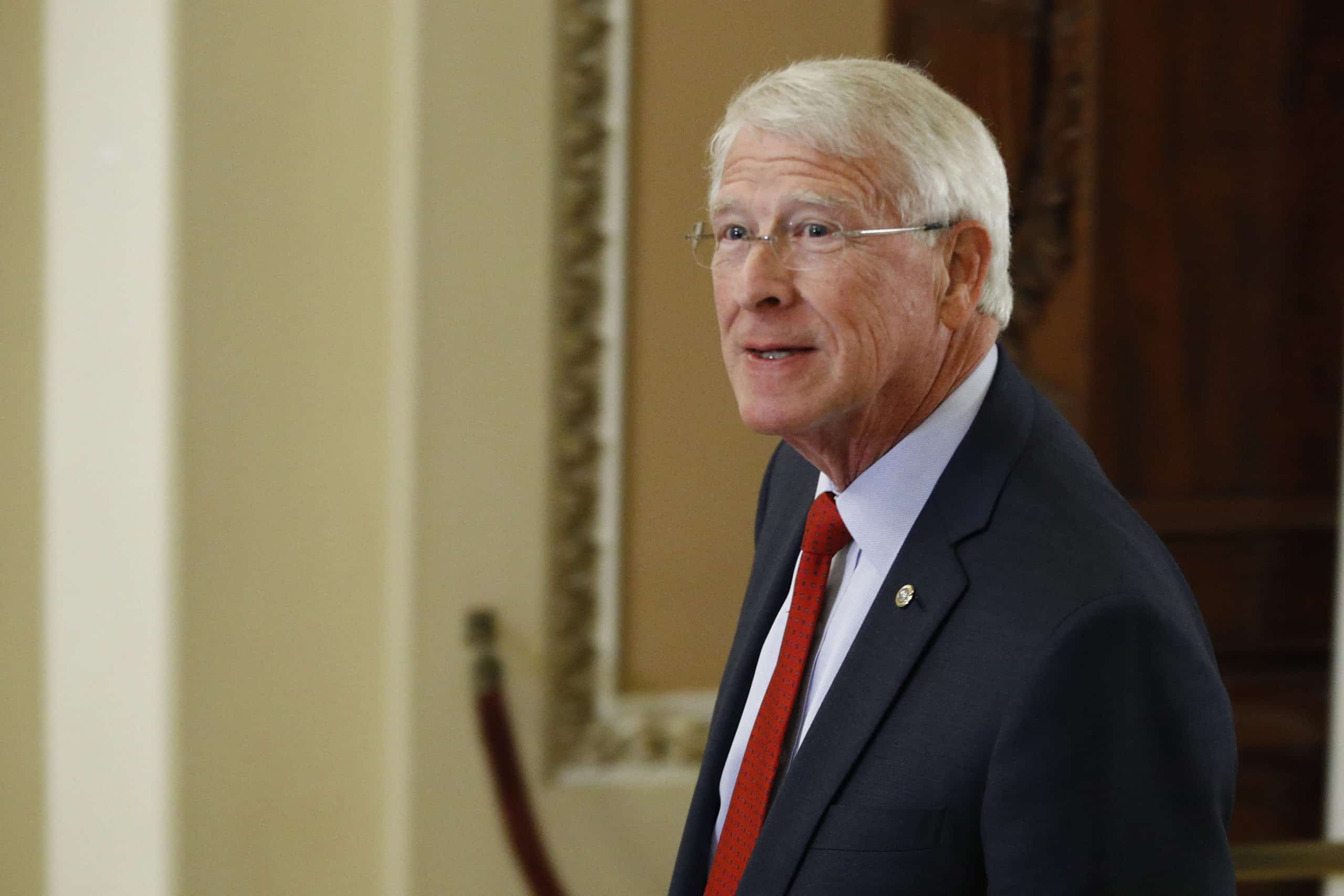Mississippi Today
Senate confirms U.S. attorney Todd Gee, who will inherit historic Mississippi welfare probe


WASHINGTON — The U.S. Senate on Friday voted to confirm the appointment of Todd Gee to run the U.S. Attorneys Office for the Southern District of Mississippi, which is overseeing what officials have called the largest public fraud case in state history.
At a time when appointments to the U.S. Department of Justice have been particularly politicized amid the prosecution of former President Donald Trump, Gee’s confirmation was pushed through with help from Mississippi’s senior U.S. Sen. Roger Wicker.
The Senate confirmation comes more than a year after President Joe Biden appointed Gee to the post.
“I talked to my colleague and friend Roger Wicker about Mr. Gee,” said Sen. J.D. Vance, a Republican from Ohio who previously worked to block any appointments to the nation’s lead law enforcement agency. “He assured me he’s a good person. We don’t have any major red flags in the background, so we ultimately voted yes. But the problem is, with all these nominations, is their boss. It’s not them, it’s their boss, who is (U.S. Attorney General) Merrick Garland.”
READ MORE: Who is Todd Gee, who will take over federal welfare scandal investigation?
Historically, unless there was some question of a nominee’s fitness, the Senate would approve the president’s picks en masse by a voice vote, but some Republican senators like Vance have insisted on confirming Gee and others through a roll call vote.
“The president is entitled to his or her nominees,” said University of Richmond Law Professor Carl Tobias. “This cuts against a long standing tradition.”
Wicker, Mississippi’s senior senator, could be seen on the Senate floor throughout the duration of Gee’s confirmation vote on Friday at times conversing with other senators.
President Joe Biden nominated Gee, who had been serving as deputy chief of the Public Integrity Section of the U.S. Department of Justice, a little over a year ago. Gee’s appointment had stalled until U.S. Sen. Cindy Hyde Smith returned a “blue slip” — an informal congressional practice that signaled her support for the nominee — in April. It took another five months for the U.S. Senate Judiciary Committee to agree to bring the nomination of Gee to a vote.
“It’s unfortunate that Mississippi had to wait a year for that,” Tobias said. “It just doesn’t make any sense at all, especially when it’s not on the merits of the nominee. It just shows you the dysfunction of the Senate.”
Senators voted 82-8 on Friday to approve Gee. Opposing his nomination were Republican U.S. Sens. Ted Cruz (R-Texas), Rick Scott (R-Florida), Rand Paul (R-Kentucky), Josh Hawley (R-Arkansas), Mike Braun (R-Indiana), Katie Britt (R-Alabama), Ron Johnson (R-Wisconsin) and Eric Schmitt (R-Missouri).
Mississippi’s southern district, which encompasses the capital city Jackson, has not had a permanent U.S. attorney at its helm since Mike Hurst stepped down in January of 2021. Interim U.S. Attorney Darren LaMarca has led the office since.
Gee will take the lead on prosecuting Mississippi’s historic welfare fraud case, in which several people have already admitted to using millions of federal grant funds that should have assisted Mississippi’s most vulnerable families instead to make favors for political allies or enrich their friends and family. Seven people, including former Mississippi Department of Human Services Director John Davis and prominent nonprofit founder Nancy New, have pleaded guilty to state or federal charges within the scheme, but none of them have been sentenced as they continue to cooperate with investigators.
The last public action the U.S. Attorneys Office has taken in the case was indicting former WWE wrestler Ted “Teddy” DiBiase Jr. in April. DiBiase pleaded not guilty.
Hinds County District Attorney Jody Owens, who secured the first indictments in the case, said last year at Davis’ plea hearing that his office was continuing to review evidence, such as text messages and other communication, as it “continue(s) to move up … the ladder” to prosecute more individuals. But since then, no one in a position above Davis has been charged.
Tobias said the U.S. Attorneys Office might have decided to wait to bring more charges, especially if it is looking at higher profile individuals, until the office had a permanent leader.
“I think it gives the public and lawyers and everyone a higher comfort level when it’s not just an acting attorney but rather someone who’s been nominated by the president, confirmed by the senate and that person checks out in terms of qualifications,” Tobias said. “That’s important. Especially if it’s high profile, because that person is going to have to do some very difficult things, maybe, if it involves these high ranking political officials. So you want the full weight of the office there.”
State Auditor Shad White, who made the initial arrests in the case in early 2020, said in a statement Friday morning that his office will continue to assist Gee’s office in the case.
“More than three years ago, my team and District Attorney Jody Owens put a stop to the welfare scheme in Mississippi with the indictment and arrest of six people,” White said. “We also turned all our evidence over to federal authorities to show the public that the case would be fully investigated, all the way. At that time three years ago, federal investigators and the U.S. Attorney asked to take the lead on prosecuting any additional people beyond the first six defendants. My office agreed to assist them in any way possible. We have enjoyed a good relationship with federal prosecutors since then as they have deliberated about whom to charge. They make that call. And the appointment of Mr. Gee changes nothing in our posture. We will continue to work with federal prosecutors to bring the case to a conclusion.”
Mississippi Today reporter Anna Wolfe reported this story from Jackson. Freelance reporter Matt Laslo reported this story from Washington. Mississippi Today’s Taylor Vance contributed to this report.
This article first appeared on Mississippi Today and is republished here under a Creative Commons license.
Mississippi Today
On this day in 1947, Jackie Robinson broke MLB color barrier

April 15, 1947

Jackie Robinson broke through the color barrier in Major League Baseball, becoming the first Black player in the 20th century.
Born in Cairo, Georgia, Robinson lettered in four sports at UCLA – football, basketball, baseball and track. After time in the military, he played for the Kansas City Monarchs in the Negro Leagues. After his success there, Dodgers general manager Branch Rickey signed Robinson, and the legendary baseball player started for Montreal, where he integrated the International League.
In addition to his Hall of Fame career, he was active in the civil rights movement and became the first Black TV analyst in Major League Baseball and the first Black vice president of a major American corporation.
In recognition of his achievements, Robinson was posthumously awarded the Presidential Medal of Freedom and the Congressional Gold Medal.
Major League Baseball retired his number “42,” which became the title of the movie about his breakthrough.
Ken Burns’ four-hour documentary reveals that Robinson did more than just break the color barrier — he became a leader for equal rights for all Americans.
This article first appeared on Mississippi Today and is republished here under a Creative Commons Attribution-NoDerivatives 4.0 International License.![]()
Mississippi Today
Mississippians highlight Black Maternal Health Week

Advocates and health care leaders joined lawmakers Monday morning at the Capitol to recognize Black Maternal Health Week, which started Friday.
The group was highlighting the racial disparities that persist in the delivery room, with Black women three times more likely to die of a pregnancy-related cause than white women.
“The bond between a mother and her baby is worth protecting,” said Cassandra Welchlin, executive director of the Mississippi Black Women’s Roundtable.
Rep. Timaka James-Jones, D-Belzoni, spoke about her niece Harmony, who suffered from preeclampsia and died on the side of the road in 2021 along with her unborn baby, three miles from the closest hospital in Yazoo City.
“It’s utterly important that stories are shared – but realize these are not just stories. This is real life,” she said.
The tragedy inspired James-Jones to become a lawmaker. She says she is working on gaining support to appropriate the funds needed to build a standalone emergency room in Belzoni.
But it isn’t just emergency medical care that’s lacking for some mothers. Mental health conditions are a leading cause of pregnancy-related deaths, defined as deaths up to one year postpartum from associated causes.
And more than 80% of pregnancy-related deaths are deemed preventable – making the issue ripe for policy change, advocates said.
“About 20 years ago, I was almost a statistic,” said Lauren Jones, a mother who founded Mom.Me, a nonprofit seeking to normalize the struggles of motherhood through community support. “I contemplated taking my life, I severely suffered from postpartum depression … None of my physicians told me that the head is connected to the body while pregnant.”
With studies showing “mounting disparities” in women’s health across the United States – and Mississippi scoring among the worst overall – more action is needed to halt and reverse the inequities, those at the press conference said.
The Mississippi Legislature passed four bills related to maternal health between 2018 and 2023, according to a study by researchers at the University of Mississippi Medical Center.
“How many times are we going to have to come before committees like this to share the statistics before the statistics become a solution?” Jones asked.
A bill that would require health care providers to offer postpartum depression screenings to mothers is pending approval from the governor.
Rep. Zakiya Summers, D-Jackson, the organizer of the press conference, commended the Legislature for passing presumptive eligibility for pregnant women this year. The policy will allow women to receive health care covered by Medicaid as soon as they find out they are pregnant – even if their Medicaid application is still pending. It was spearheaded by Rep. Missy McGee, R-Hattiesburg.
Summers also thanked Rep. Kevin Felsher, R-Biloxi, for pushing paid parental leave for state employees through the finish line this year.
Speakers emphasized the importance of focusing Black Maternal Health Week not just on mitigating deaths but on celebrating one of life’s most vulnerable and meaningful events.
“Black Maternal Health Week is a celebration of life, since Black women don’t often get those opportunities to celebrate,” said Nakeitra Burse, executive director of Six Dimensions, a minority women-owned public health research agency. “We go into our labor and delivery and pregnancy with fear – of the unknown, fear of how we’ll be taken care of, and just overall uncertainty about the outcomes.”
This article first appeared on Mississippi Today and is republished here under a Creative Commons Attribution-NoDerivatives 4.0 International License.![]()
Mississippi Today
Trump to appoint two Northern District MS judges after Aycock takes senior status

President Donald Trump can now appoint two new judges to the federal bench in the Northern District of Mississippi.
U.S. District Judge Sharion Aycock announced recently that she was taking senior status effective April 15. This means she will still hear cases as a judge but will have a reduced caseload.
“I have been so fortunate during my entire legal career,” Aycock said in a statement. “As one of only a few women graduating in my law school class, I had the chance to break ground for the female practitioner.”
A native of Itawamba County, Aycock graduated from Tremont High School and Mississippi State University. She received her law degree from Mississippi College, where she graduated second in her class.
Throughout her legal career, she blazed many trails for women practicing law and female jurists. She began her career as a judge when she was elected as a Mississippi Circuit Court judge in northeast Mississippi in 2002, the first woman ever elected to that judicial district.
She held that position until President George W. Bush in 2007 appointed her to the federal bench. After the U.S. Senate unanimously confirmed her, she became the first woman confirmed to the federal judiciary in Mississippi.
This makes Aycock the second judge to take senior status in four years. U.S. District Judge Michael Mills announced in 2021 that he was taking senior status, but the U.S. Senate still has not confirmed someone to replace him.
President Joe Biden appointed state prosecutor Scott Colom to fill Mills’ vacancy in 2023. U.S. Sen. Roger Wicker approved Colom’s appointment, but U.S. Sen. Cindy Hyde-Smith blocked his confirmation through a practice known as “blue slips,” where senators can block the confirmation of judicial appointees in their home state.
This means President Trump will now have the opportunity to appoint two federal judges to lifetime appointments to the Northern District. U.S. District Judge Debra Brown will soon be the only active federal judge serving in the district. Aycock, Mills, and U.S. District Judge Glen Davidson will all be senior-status judges.
Federal district judges provide crucial work to the federal courts through presiding over major criminal and civil trials and applying rulings from the U.S. Supreme Court and the U.S. Court of Appeals in the local districts.
This article first appeared on Mississippi Today and is republished here under a Creative Commons Attribution-NoDerivatives 4.0 International License.![]()
-

 News from the South - Arkansas News Feed6 days ago
News from the South - Arkansas News Feed6 days agoMeasles cases confirmed in Arkansas children after travel exposure
-

 Mississippi Today7 days ago
Mississippi Today7 days agoProgram helps students with disabilities forge paths to careers
-

 News from the South - North Carolina News Feed7 days ago
News from the South - North Carolina News Feed7 days agoTax Day of April 15 is essentially May 1 in North Carolina | North Carolina
-

 Mississippi Today6 days ago
Mississippi Today6 days agoA self-proclaimed ‘loose electron’ journeys through Jackson’s political class
-

 News from the South - Alabama News Feed5 days ago
News from the South - Alabama News Feed5 days agoImpacts of Overdraft Fees | April 11, 2025 | News 19 at 10 p.m.
-

 News from the South - Missouri News Feed7 days ago
News from the South - Missouri News Feed7 days agoSleeping 14-year-old critically injured by bullet in Ferguson home; father flees scene
-

 News from the South - Tennessee News Feed7 days ago
News from the South - Tennessee News Feed7 days agoQuestions mount over federal drug discount program | Tennessee
-

 News from the South - Alabama News Feed6 days ago
News from the South - Alabama News Feed6 days agoPilot Speaks on Helicopter Crash | April 10, 2025 | News 19 at 10 p.m.

















































